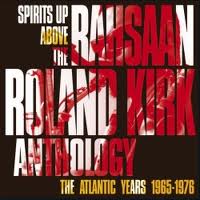Home » Jazz Articles » Extended Analysis » Rahsaan Roland Kirk: Rahsaan Roland Kirk: Spirits Up Abo...
Rahsaan Roland Kirk: Rahsaan Roland Kirk: Spirits Up Above - The Atlantic Years 1965-1976
 Rahsaan Roland Kirk
Rahsaan Roland KirkSpirits Up Above: The Atlantic Years 1965-1976
Warner Jazz
2012
He was as funky as singer James Brown. With three horns in his mouth, he sounded like the entire JB reed section. And onstage, with a truckload of instruments around his neck, he was the hardest working man in jazz business. Saxophonist, flautist, clarinetist and multiple custom-reed instrumentalist Rahsaan Roland Kirk (1936-77) livened up the music scene like few other artists before or since.
Blind since early childhood, Kirk started out as an R&B tenor player. He recorded his first album, Third Dimension (King) in 1956, and spent a short while in bassist Charles Mingus' band. By 1960, when he released his second disc, Introducing Roland Kirk (Chess), he was recording and performing almost exclusively under his own name. Along the way, Kirk acquired an array of exotic reed instruments—the best known being the stritch, a straightened-out alto saxophone, and the manzello, a soprano saxophone customized with a mellophone bell—and learnt to blow three instruments at the same time, creating a drone on one while fingering the others with one hand apiece. He mastered circular breathing, which allowed him to play sustained chords beneath his top line. His vocalized flute style was picked up widely by jazz and rock musicians.
Kirk was also prolific, recording, on average, over an album a year from 1960 until his stroke-induced, early death. Warner Jazz's two-disc anthology takes a track or two from each of the albums Kirk recorded during his decade-long purple period on Atlantic: Here Comes the Whistleman (1965), The Inflated Tear (1967), Left and Right (1968), Volunteered Slavery (1969), Rahsaan Rahsaan (1970), Natural Black Inventions: Root Strata (1971), Blacknuss (1971), A Meeting of the Times (1972), I, Eye, Aye! (1972) Prepare Thyself to Deal With a Miracle (1973), Bright Moments (1973), The Case of the Three-Sided Dream in Audio Color (1975) and Other Folks Music (1976); and one track, recorded in 1968, from the 1990 anthology Does Your House Have Lions.
The 22-track collection, sequenced more or less chronologically, follows Kirk's trajectory from a neo-bar walking tenor saxophonist ("Making Love After Hours" and "Roots" from Here Comes the Whistleman), into a more ambitious, but no less compelling, composer and player, beginning with 1967's "Inflated Tear." Many of Kirk's most celebrated tracks are included, along with a couple of dogs—"Portrait of Those Beautiful Ladies" and "Freaks For the Festival" from 1975's The Case of the Three-Sided Dream in Audio Color, an unfortunate attempt to buff up the music for the emergent jazz-funk audience.
Initially derided by "serious" jazz critics, who thought he belonged in a carnival side show, Kirk ultimately won over most skeptics. He was an experimentalist hardwired into blues and gospel roots, an incandescent soloist, and a supreme entertainer. He was also an articulate supporter of the black and civil rights movement. He just about had it all—and his music still sends shivers up the spine 35 years after his death.
Tracks: CD1: Making Love After Hours; Roots; The Black and Crazy Blues; The Inflated Tear; Lovellevelliloqui; Lady's Blues; Volunteered Slavery; Spirits Up Above; A Tribute to John Coltrane; Medley; Something for Trane That Trane Could Have Said; Ain't No Sunshine; Blacknuss. CD2: Do Nothing' Till You Hear From Me; Carney and Begard Place; Seasons (One Mind Winter, Summer, Ninth Ghost); Pedal Up; Anysha; Three for the Festival; Portrait of Those Beautiful Ladies; Freaks for the Festival; Serenade to a Cuckoo.
Personnel: Rahsaan Roland Kirk: tenor saxophone, manzello, stritch, clarinet, flute, nose flute, whistle, English horn, flexafone, harmonica, bass saxophone, vocals; various personnel.
Personnel
Ornette Coleman
saxophone, altoAlbum information
Title: The Atlantic Years | Year Released: 2018 | Record Label: Rhino
< Previous
Contemplation
Next >
Blossom & Bee
Comments
Tags
Rahsaan Roland Kirk
Extended Analysis
Chris May
Warner Jazz
United States
James Brown
Charles Mingus
Rahsaan Roland Kirk: Spirits Up Above - The Atlantic Years 1965-1976
For the Love of Jazz
 All About Jazz has been a pillar of jazz since 1995, championing it as an art form and, more importantly, supporting the musicians who create it. Our enduring commitment has made "AAJ" one of the most culturally important websites of its kind, read by hundreds of thousands of fans, musicians and industry figures every month.
All About Jazz has been a pillar of jazz since 1995, championing it as an art form and, more importantly, supporting the musicians who create it. Our enduring commitment has made "AAJ" one of the most culturally important websites of its kind, read by hundreds of thousands of fans, musicians and industry figures every month.





















